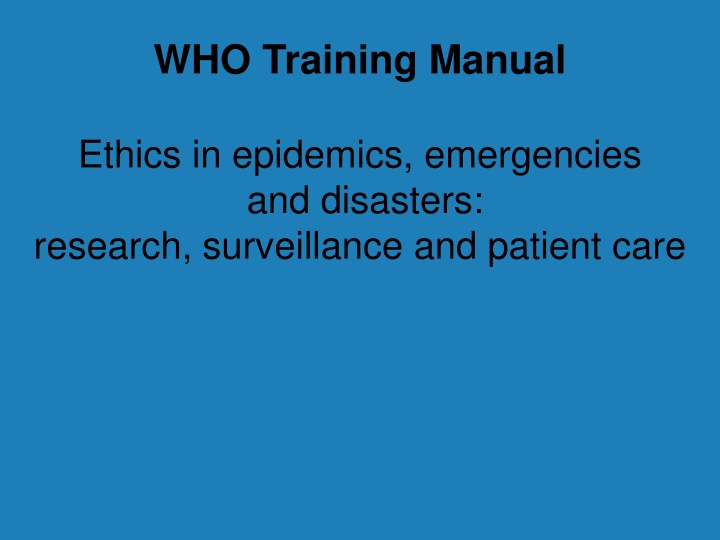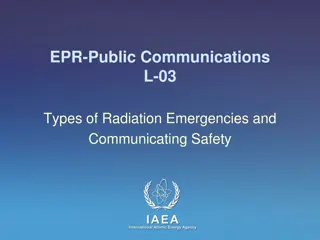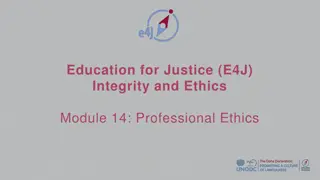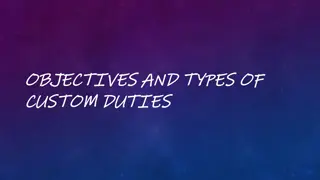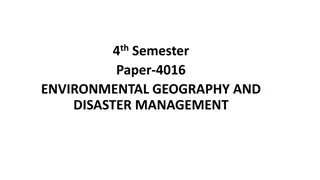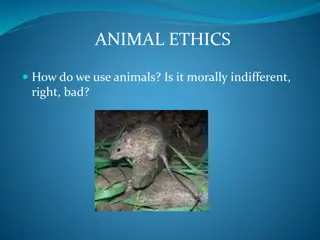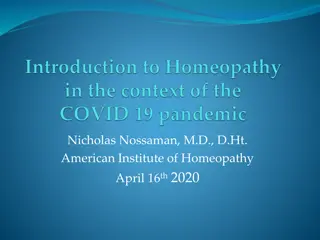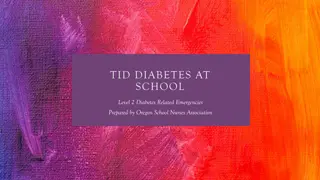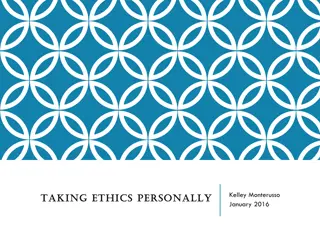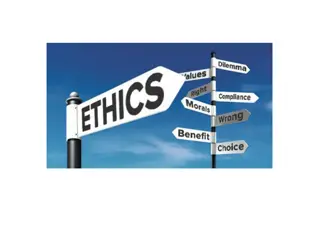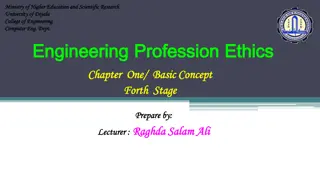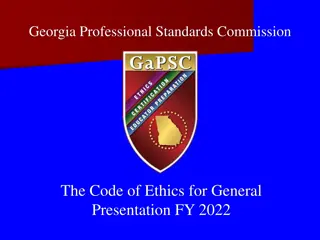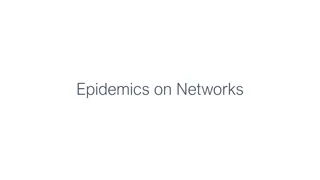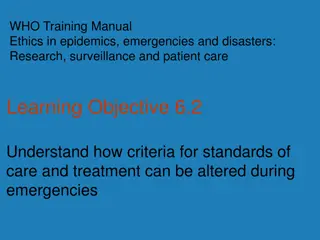Ethics in Epidemics and Emergencies: Professional Duties and Frameworks
Explore the ethics frameworks in epidemics and disasters, including medical care ethics, public health ethics, and research ethics. Understand the implications on health care workers' duties and conflicts of interest in emergency research activities.
Download Presentation

Please find below an Image/Link to download the presentation.
The content on the website is provided AS IS for your information and personal use only. It may not be sold, licensed, or shared on other websites without obtaining consent from the author.If you encounter any issues during the download, it is possible that the publisher has removed the file from their server.
You are allowed to download the files provided on this website for personal or commercial use, subject to the condition that they are used lawfully. All files are the property of their respective owners.
The content on the website is provided AS IS for your information and personal use only. It may not be sold, licensed, or shared on other websites without obtaining consent from the author.
E N D
Presentation Transcript
WHO Training Manual Ethics in epidemics, emergencies and disasters: research, surveillance and patient care
Core competence 7 Ability to discuss the professional duties of health care workers during public health surveillance or research in emergencies
Corresponding learning objectives Distinguish three ethics frameworks: medical care ethics, public health ethics and research ethics, and explore the ways in which the values and principles that guide these frameworks diverge or overlap. Explain what is meant by therapeutic misconception and how it could affect the duties of health care workers in emergencies. Explain the potential conflicts of interest of health care workers participating in emergency research activities. L.O. 1.1
Medical care ethics Individual emphasis Focuses on patient autonomy and best interest Patient-focused values Promoting cure and treatment of existing health conditions Justice and duties to others, including public good, are never far away L.O. 1.1
Public health ethics Measures designed to protect and enhance health of public and prevent ill-health Emphasizes greater good of a population or community and pursuit of collective action May be tension between duty to place rights and needs of individuals above those of society Since public is comprised of individuals, public health initiatives can result in benefits for individuals too L.O. 1.1
Research ethics Goal is producing evidence to advance greater good, including for individuals not yet affected by a condition/issue Points to the primary value of the human person and focuses largely on constraining the use of individuals as means for the pursuit of collective scientific or technological ends (Kenny and Giacomini 2005) L.O. 1.1
Use of ethical frameworks Context will dictate which framework should prevail But ethical obligations of other frameworks may still apply e.g. individual informed consent in research, anonymizing data collected through public health surveillance Aims and ethical obligations of a role need to be set out clearly. To whom is the duty of care owed? Multiple allegiances can be a challenge e.g. clinician also performing research in public health emergency L.O. 1.1
Overlap of ethics frameworks Responsibilities Principles Practices Medical care ethics Public health service ethics Research ethics To whom duty of care is owed Aims of intervention Role of informed consent Issues of confidentiality & privacy Meaning of fairness & equity L.O. 1.1
Therapeutic misconception (TM) The therapeutic misconception occurs when a research subject fails to appreciate the distinction between the imperatives of clinical research and of ordinary treatment, and therefore inaccurately attributes therapeutic intent to research procedures. Lidz & Appelbaum 2002: V55 L.O. 1.1
Recommendations Potential participants should not be excluded from participating because they have a TM However, researchers have responsibilities to dispel unrealistic hopes of TM Researchers have duty to ensure decision to participate is well-informed and as voluntary as possible Must differentiate medical attention received as study participant from normal medical attention L.O. 1.1
Strategies to reduce risk of therapeutic misconceptions Augmented informational process using a neutral discloser a neutral individual (not involved in study) explains methodology to patients Community consultation allows explanation of study goals, procedures, potential risks and benefits while considering educational, cultural and linguistic differences Pre-study community information sessions increase community understanding, reduce misconceptions, encourage informed and voluntary decision-making, and build trust L.O. 1.1
Definition Conflict of Interest A situation in which a person has a private or personal interest sufficient to appear to influence the objective exercise of his or her official duties as, say, a public official, an employee, or a professional. (MacDonald, McDonald and Norman 2002) Any factor that might tend to undermine a competent researcher s ability to make scientifically reliable judgments concerning research strategy, evidence or conclusions. (Davis 1999) A set of circumstances that creates a risk that professional judgment or actions regarding a primary interest will be unduly influenced by a secondary interest. (Institute of Medicine 2009) L.O. 1.1
Financial Conflict of Interest Setting personal interests (e.g. money, promotion) over their professional duties, such as protecting the welfare of participants or ensuring the integrity of the scientific process Community leaders working in collaboration with public health researchers may have financial interests that conflict with their responsibilities to either their community or the researchers L.O. 1.1
Non-financial Conflict of Interest Tendency to focus on what s measurable Non-financial interests often ignored completely Given much less attention in policies Sometimes not considered very harmful Seemingly less problematic than financial interests Recognizing these threatens professional identity Objectivity, neutrality, independence Non-financial interests can be especially problematic, because they are less recognized and less understood L.O. 1.1
Conclusions Core Competence 7 The fields of medical care, public health and research all have slightly different ethical frameworks however, principles and practices strongly overlap Therapeutic misconception can be countered by an augmented informational process using a neutral discloser, community consultation, and pre-study community information sessions Financial and non-financial interest can conflict with researchers and other agents ethos and professional duties L.O. 1.1
Sources PS Appelbaum, LH Roth LH, CW Lidz, P Benson, W Winslade. False hopes and best data: consent to research and the therapeutic misconception. Hastings Centre Report 17, no. 2 (1987):20 24. MacDonald, C.; McDonald, M.; Norman, W. 2002. Charitable Conflicts of Interest Journal of Business Ethics 39(1): 67-74. Davis, M. 1999. Ethics and the University (London, UK: Routledge) Institute of Medicine. Conflict of Interest in Medical Research, Education, and Practice. Edited by B. Lo and M.J. Field, Washington, D.C.: Institute of Medicine Committee on Conflict of Interest in Medical Research, Education, and Practice, National Academies Press, 2009. http://www.nap.edu/catalog.php?record_id=12598 L.O. 1.1
